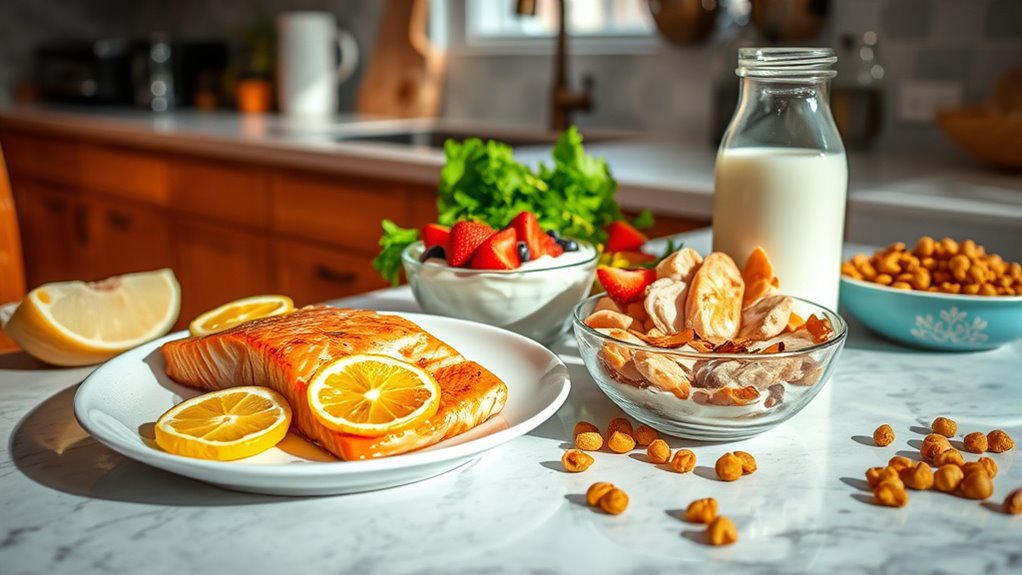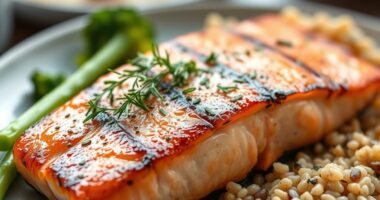As a woman over 40, your protein needs increase to help maintain muscle, support hormonal balance, and age gracefully. Experts suggest aiming for 1.2 to 1.6 grams of protein per kilogram of body weight daily, with active women reaching 1.5 to 2.2 grams. Spreading your intake evenly across meals boosts muscle repair and metabolism. For detailed strategies on choosing quality sources and timing, keep exploring how to meet your daily protein goals effectively.
Key Takeaways
- Women over 40 should aim for 1.2–2.2 g of protein per kg of body weight daily.
- Protein needs increase slightly after age 50 to support muscle maintenance and healthy aging.
- Distribute protein evenly across three main meals every 3–4 hours for optimal muscle repair.
- Prioritize high-quality, complete proteins from animal and plant sources, including leucine-rich foods.
- Incorporate protein-rich snacks and post-exercise intake to meet daily requirements and preserve muscle mass.
Understanding Protein Requirements for Women Over 40

As women age beyond 40, their protein needs change due to hormonal shifts and natural muscle loss. Your body requires more protein than the standard 0.8 grams per kilogram to support muscle maintenance and overall health. Active women, especially during perimenopause and menopause, should aim for about 1.5 to 2.2 grams per kilogram daily. After 50, this increases slightly to 1.2–1.6 grams per kilogram to help preserve muscle mass. Spreading protein evenly across meals every 3-4 hours enhances muscle repair and metabolic benefits. During hormonal fluctuations like the luteal phase, your protein needs might temporarily modify. Recognizing these changes supports optimal health, and understanding how nutritional needs evolve with age can further empower women to make informed dietary choices that align with their changing needs. Incorporating nutrition education can further empower women to make informed dietary choices that align with their changing needs. Additionally, staying aware of muscle mass preservation strategies can help mitigate age-related decline.
The Role of Protein in Healthy Aging and Muscle Preservation

Protein plays an essential role in supporting healthy aging and preserving muscle mass, especially for women over 40. It helps maintain strength, mobility, and cognitive function. Consuming around 18% of your daily calories from protein boosts these benefits more effectively than 15%. Different sources have unique impacts:
| Protein Source | Benefits |
|---|---|
| Plant-based | Supports physical and cognitive health |
| Animal-based | Enhances mobility but may increase disease risk |
High-quality protein provides all essential amino acids, vital for muscle preservation. An evenly distributed intake throughout the day maximizes its anabolic effects. Prioritizing diverse, nutrient-dense proteins helps you age gracefully while maintaining strength and reducing chronic disease risk. Incorporating dietary diversification ensures you receive a broad spectrum of amino acids and other vital nutrients essential for healthy aging. Additionally, choosing proteins with essential amino acids can further optimize muscle maintenance and overall health. Emphasizing the importance of protein quality can help ensure optimal benefits for aging women. Moreover, understanding protein requirements tailored to women over 40 can support more personalized nutrition strategies for optimal health outcomes. Recognizing the benefits of hydrotherapy and aquatic exercise can further enhance mobility and recovery, contributing to overall well-being during aging.
How to Distribute Protein Intake Throughout the Day
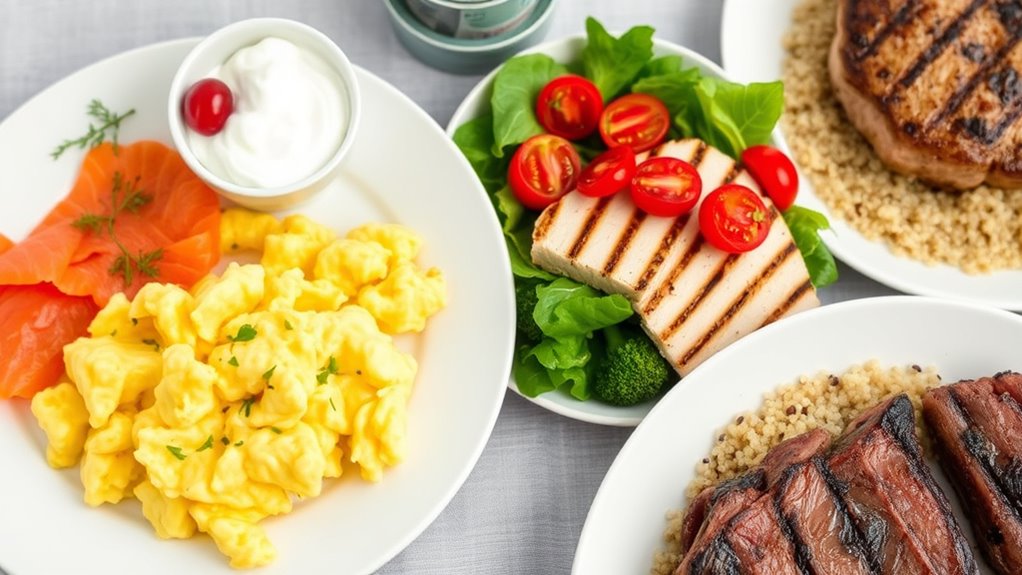
Distributing your protein intake evenly throughout the day maximizes muscle preservation and supports overall health. Aim for about 30-30 grams of protein at each main meal, including a mix of animal and plant sources. After exercise, consume 30-40 grams of protein within an hour to optimize recovery. Spread your protein intake over three meals to maintain steady amino acid levels. Incorporate leucine-rich foods like poultry, fish, or whey protein into each meal to trigger muscle synthesis. For snacks, target 10-20 grams of protein, choosing options like Greek yogurt, nuts, or protein bars, spaced between meals. Women over 40 may need slightly more protein, so adjust portions accordingly. Using high-quality protein sources enhances protein quality and supports muscle maintenance as you age. Additionally, understanding amino acid profile helps you select the best sources for your needs. Consistent distribution guarantees your muscles stay strong and supports overall vitality as you age. Incorporating nutrient timing strategies can further optimize muscle repair and growth, and mindful practices like relaxation techniques may improve digestion and nutrient absorption.
Choosing Quality Protein Sources for Optimal Benefits
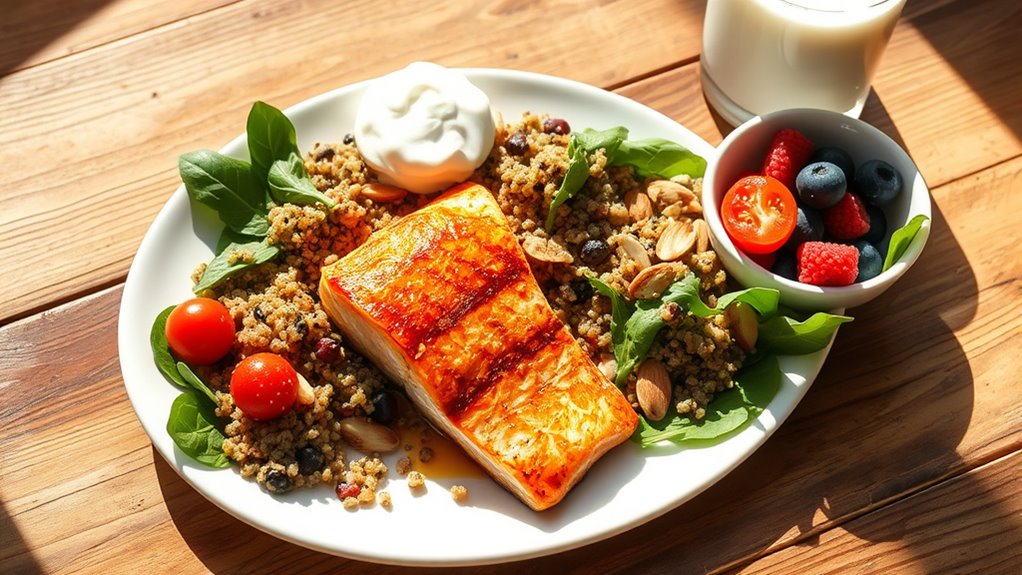
Choosing high-quality protein sources can considerably enhance your overall health and support your fitness goals, especially as you age. Prioritize complete proteins from animal sources like beef, poultry, fish, eggs, and dairy, which provide all essential amino acids. Incorporate plant-based options such as legumes, soy, nuts, seeds, and quinoa to diversify your intake and boost nutrient variety. Combining different plant proteins can create a complete amino acid profile, supporting muscle and bone health. Consider the table below to guide your choices:
| Protein Source | Benefits | Considerations |
|---|---|---|
| Animal Proteins | Complete amino acids, nutrient-rich | Lower in saturated fats if lean |
| Plant Proteins | Fiber, vitamins, plant compounds | May need combination for completeness |
| Dairy & Eggs | Bone health, high-quality protein | Moderation for lactose intolerance |
| Seafood | Lean, omega-3 fatty acids | Sustainability concerns |
Opt for nutrient-dense, low-fat options aligned with your preferences. Additionally, choosing protein sources that are sustainably farmed or caught can support environmental health and ensure you’re making responsible dietary choices.
Practical Strategies to Meet Daily Protein Goals
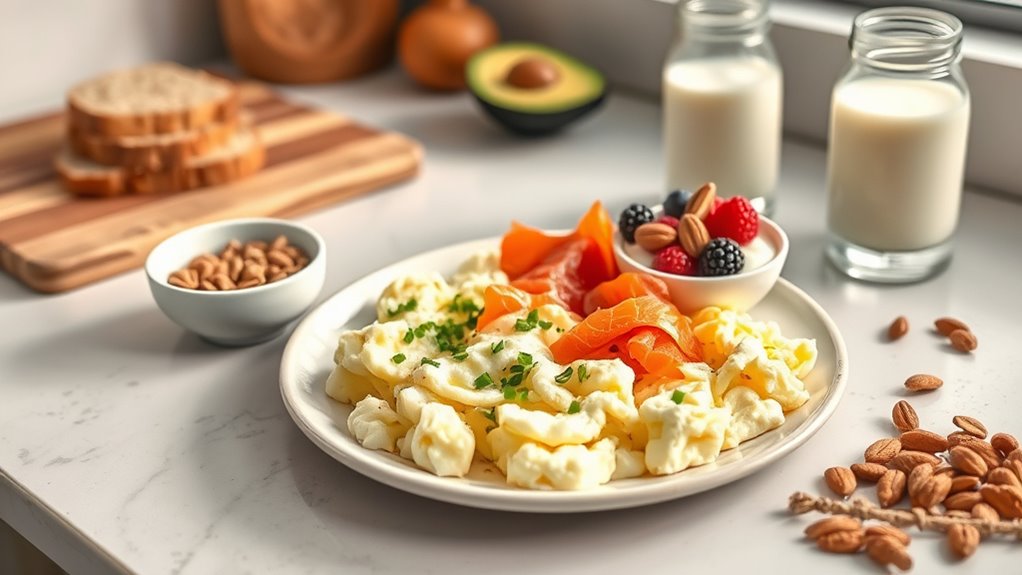
To effectively meet your daily protein goals, plan your meals and snacks carefully to include high-quality sources in each serving. Incorporate lean meats, fish, eggs, dairy, legumes, and nuts consistently throughout the day. Use meal planning to distribute protein evenly every 3-4 hours, supporting muscle maintenance and overall health. Prepare protein-rich snacks like Greek yogurt, cottage cheese, or a handful of nuts to keep your intake steady. Consider supplements if you struggle to reach your target, but focus on whole foods first. Familiarize yourself with food labels and nutritional values to make informed choices. Flexibility is key—mix different protein sources to keep your diet interesting while meeting your goals. Regular strength training amplifies these efforts, helping you preserve muscle as you age. Incorporating a variety of nutrient-rich foods can also enhance your overall nutrition and support your health goals. Additionally, exploring Frozen Delights like frozen yogurt can be a tasty way to include probiotics and calcium in your diet. Paying attention to food safety when handling and storing foods ensures you maintain nutrient quality and avoid contamination. Incorporating visual and auditory cues can further support your understanding of nutritional information and food choices. Using information on benefits from wood-burning can inspire sustainable and efficient heating solutions for your home.
Frequently Asked Questions
Can Plant-Based Proteins Fully Meet My Daily Needs After 40?
You wonder if plant-based proteins can fully meet your daily needs. While plant sources like lentils, tofu, and edamame are nutritious, they often provide less protein per serving than animal products. To guarantee you’re getting enough, incorporate a variety of plant-based options and consider using protein powders or supplements if needed. Balancing your diet with diverse sources helps meet your protein goals and supports healthy aging.
How Does Menopause Affect My Protein Requirements?
Think of your body as a building that needs more bricks during renovations. Menopause speeds up tissue breakdown, so your protein requirements rise. You should aim for about 1.0–1.2 g/kg daily to support muscle and bone health. Without enough, you risk muscle loss and frailty. Distribute protein evenly across meals, focus on high-quality sources, and consider supplements if your intake drops. This helps keep you strong and active through menopause.
Are Protein Supplements Necessary for Aging Women?
You might wonder if you need protein supplements as you age. While it’s possible to meet your needs through a balanced diet, supplements can be helpful if you’re restricting your intake, have dietary limitations, or struggle to get enough protein daily. They’re especially useful when combined with resistance exercises to support muscle maintenance and strength. Ultimately, whether you need them depends on your diet, lifestyle, and health goals.
What Are the Signs of Insufficient Protein Intake?
Imagine feeling constantly tired, your hair thinning, and your nails becoming brittle. These are signs you might not be getting enough protein. You could notice swelling in your extremities, muscle loss, or increased hunger even after eating. Mood swings, difficulty sleeping, and frequent infections also signal insufficient protein intake. If you see these signs, it’s time to evaluate your diet and boost your protein sources for better health.
How Can I Increase Protein Without Gaining Weight?
If you want to boost your protein intake without gaining weight, focus on adding lean protein sources like chicken, fish, or plant-based options to every meal. Use high-quality protein powders for convenience, and watch your portion sizes. Incorporate protein-rich snacks and combine your diet with regular strength training. Staying mindful of your overall calorie intake and maintaining balanced meals helps you increase protein while keeping your weight in check.
Conclusion
Just like the phoenix rising anew, you can rejuvenate your body by meeting your protein needs. By choosing quality sources and spreading your intake wisely, you harness the power to preserve muscle and stay vibrant. Remember, every meal is a chance to fuel your transformation—think of it as your personal alchemy. Embrace this journey, and watch your strength and vigor soar, proving that age is just a number in your story of renewal.
